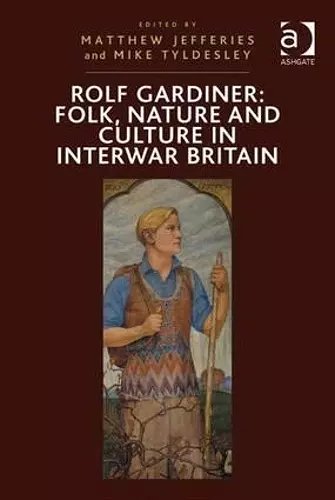Rolf Gardiner: Folk, Nature and Culture in Interwar Britain
Mike Tyldesley author Matthew Jefferies editor
Format:Hardback
Publisher:Taylor & Francis Ltd
Published:23rd Dec '10
Currently unavailable, and unfortunately no date known when it will be back
This hardback is available in another edition too:
- Paperback£38.99(9781032927879)

Folk dancer, forester, poet and visionary, Rolf Gardiner (1902-71) is both a compelling and troubling figure in the history of twentieth-century Britain. While he is celebrated as a pioneer of organic farming and co-founder of the Soil Association, Gardiner's organicist outlook was not confined to agriculture alone. Convinced that a healthy culture and society could only flourish when it was rooted in the soil, Gardiner sought national regeneration too. One of the most colourful and controversial figures of the interwar period, Gardiner believed Britain's future lay not with its doomed empire, but in ever closer union with its 'kin folk, kin tongued' neighbours in Germany, the Netherlands and Scandinavia. Fascinated by the Weimar Republic's myriad youth leagues and life reform movements, Gardiner became an important conduit between North Sea and Baltic. Yet while an enthusiasm for hiking, nudism, folk dancing and voluntary labour camps must have appeared harmlessly eccentric to many in 1920s Britain, by the late-1930s Gardiner's continued engagement with Germany was to have altogether darker connotations. This volume, which brings together seven scholars currently working on different aspects of Gardiner's life and work, eschews a straightforwardly biographical approach and instead focuses on the decades when he was at his most dynamic and radical. Situating Gardiner within the wider political and cultural contexts of the interwar years and exploring youth culture, the origins of the organic movement, Anglo-German relations and British cultural history, it is an essential addition to modern history libraries.
'The contributors are outstanding scholars in their fields, and are conspicuously fair-minded in their approach to Gardiner, a man who aroused both powerful admiration and dislike in those who knew him: sometimes in the same person. The book conveys a strong sense of Gardiner's complex character, but also situates him in a wider political and cultural context, helping to broaden our understanding of the interwar period.' Philip Conford, author of The Origins of the Organic Movement 'Alternately revered as a pioneer of eco-friendly agriculture or reviled as a pro-Nazi crank, Rolf Gardiner stood at the centre of a range of social movements - youth culture, folk dance, naturism, organic farming - that gained strength in Britain and Germany during the interwar years and continue to resonate in our society today. A balanced evaluation of his influence is well overdue, and in this book, Matthew Jefferies and Mike Tyldesley have put together an intelligent and important collection of essays by some of the most significant scholars in the field to shed light on these issues. As a result of these efforts, a better nuanced understanding of Gardiner's work and its internal tensions is at last made possible.' Piers H.G. Stephens, University of Georgia, USA 'This is a significant book. It is a fair- and open-minded attempt to make sense of a figure who continues to defy easy categorization, and it has much to offer cultural, political, and rural historians, regardless of whether or not they have previously been aware of Rolf Gardiner.' Twentieth Century British History 'There is a great deal of fascinating material, concrete facts as well as the authors’ opinions. Even those who care only about Gardiner’s role in the folk revival would be well advised to study all the chapters. I highly recommend Griffiths’s short interpretative essay, as well as the in-depth, data-based studies, particularly those by Fowler and Jefferies. The authors are to be particularly commended
ISBN: 9781409412045
Dimensions: unknown
Weight: 521g
202 pages